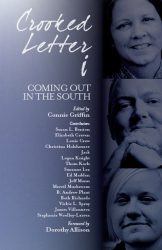 Crooked Letter i: Coming Out in the South
Crooked Letter i: Coming Out in the South
Edited by Connie Griffin
Foreword by Dorothy Allison
Published by New South Books
Published September 15, 2015
LGBT History (personal narratives)
208 pages • $25.95 • Find on Amazon.com
Reviewed by Brooke Fredericksen
April 4, 2016.
Crooked Letter i: Coming Out in the South is an engaging collection of personal essays from LGBT people whose stories are all different but who have one thing in common: their connections to the American South.
Like much of the literature of the American South, “place” has an essential role in this collection. From the physical settings throughout the Southern U.S. to the religious and cultural ideas that permeate this region, what we call the “South” exists palpably in this collection.
However, unlike many other place-centric Southern literary works, Crooked Letter i is more about the people: their stories and how they relate to the South that birthed them, reared them, and oftentimes rejected and expelled them for who they are. These are stories of coming out to acceptance as well as rejection, love as well as hatred and shunning, and they break the mold of what may be considered traditional coming out stories.
There are, of course, the heart wrenching stories of having to hide, of being raided, arrested, stigmatized (Merril Mushroom’s “The Gay Kids and The Johns Commission” being the most striking, evocative example) and facing the wrath of one’s own family and being disowned (as in Elizabeth Craven’s “Almost Heaven,” the first story in this collection).
But what sets this collection apart and inspires are the stories of those who came out and stayed or came out and came back to the South and live lives of love and acceptance.
One of my favorite examples of this is Jeff Mann’s “Southern (LGBT) Living.” It’s not as if Mann didn’t suffer his share of non-acceptance in the South. But as he says at the end of his story, “For some queer folks, the hate they face in the South causes them to hate in return” and causes them to leave the region for friendlier places. But for Mann, who has chosen to stay and love his beloved South, he wishes “bourbon, barbeque, and biscuits, determined queer comrades and devoted lovers” and “the strength that allows life on the front lines, where the battle is fiercest and its outcome unsure, where courage counts for everything, and where the greatest changes can be forged.” His optimism is inspirational.
Changes achieved by the older people in these stories have paved the way and given strength to LGBT youth coming out in the South today, such as Stephanie Woolley-Larrea. In “Straight as Florida’s Turnpike,” Woolley-Larrea admits she owes a debt to those who came before: “Truthfully, my coming-out story isn’t wrought with the same sort of pain, rejection, and stigma as many of those who came out before me. Because, of course, those men and women paved the way.”
This collection of stories will have you angry at the way things used to be in the South, angry about the strict religious mores and the lack of compassion for LGBT people, and angry that family and strangers would shun and disown their own. But it will also fill you with hope and joy and impart a true sense of the American South, with its unique culture, land, and heritage, and the possibility that our gay, lesbian, bisexual, and transgender brothers and sisters are changing the region for the better as they remake their homes and their places within them.

